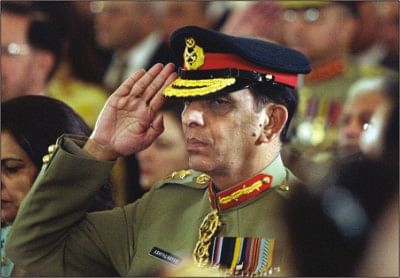Pakistan army chief gets extension

On 22 July, the Government of Pakistan announced that it has decided to extend the term of the army chief General Ashfaq Parvez Kayani (58) by three years. General Kayani was originally due to retire on November 28, but will now remain in office until 2013.
Prime Minister Yousaf Raza Gilani described the general as essential to the nation's fight against militancy. General Kayani has led the Pakistani army since November 2007 when General Pervez Musharraf stepped aside.
Gilani said that the government was not under any kind of pressure prior to its decision to extend the Army Chief's tenure.
The extension is only the second such incident in Pakistan's history when a civilian regime has increased the services of the Chief of the Army Staff (COAS).
The first such extension was given by former President Iskandar Mirza to General Ayub Khan. The three army chiefs - Field Marshal Ayub Khan, General Zia-ul-Haq and General Pervez Musharraf had extended their own terms while holding their office as the President.
Some analysts say there seems to be three basic reasons for the extension: the perceived successes in the war against the Taliban in the tribal areas; his rapport with American military officers; and, his keeping the military out of politics.
The US pays the Pakistani military an estimated $1 billion a year to fight the militants. They heavily depended on General Kayani's permission for the CIA drones striking at Qaeda and Taliban operatives in the tribal areas and appreciative of his efforts to ensure transit on the supply route to US and Nato troops in Afghanistan that runs through Pakistan.
The US has praised General Kayani for his army's campaign against the Taliban but behind the scenes the Americans have reportedly been disappointed with his failure to disown the Afghan Taliban who benefit from sanctuaries in Pakistan's tribal areas.
Kayani has been the focal point for the Obama administration. The US Joint Chiefs of Staff Admiral Mike Mullen paid regular visits to General Kayani to encourage him to stop the Pakistan-based Taliban from crossing into Afghanistan and fighting the US.
General Kayani is regarded as the nation's most powerful person who is not corrupt and as the army chief he is the de facto guardian of the nuclear arsenal. The US is comfortable with the current position of the military overseeing all elements of the nuclear programme in Pakistan.
Although the top civil officers dominate the National Command Authority which controls the nuclear arms, many of the day-to-day operations including security of nuclear weapons are reportedly made by the Special Plans Division, located near the Islamabad airport. It is run by General Khalid Kidwai under overall command of General Kayani.
General Kidwai was appointed by former President General Musharraf. General Kidwai remains in place after the Zardari Government came into power. Pakistan possesses 75 to 100 nuclear weapons. The deepest concern for the US and allies is these weapons falling under in the hands and control of Islamic extremists.
At the moment, Pakistan's nuclear weapons are judged to be safe. The nuclear warheads are separated from the weapons systems. The Americans have helped install a special system of locking and unlocking that would be extremely difficult for an outsider to operate.
Although Pakistan has recently introduced parliamentary form of government in which the chief executive is the Prime Minister, it is widely believed that General Kayani has a strong say and is the key person who makes all the vital strategic decisions.
Kayani is widely regarded as a quiet, professional soldier, who has helped transform the army in his tenure from a largely conventional force to one that is effectively fighting an irregular war inside its own borders. He was the former head of Inter-Services Intelligence (ISI), a position that provided him intimate knowledge of activities of Pakistan's various intelligence agencies. He maintains a low public profile and is seen as a thinking General.
From the very beginning he stated a policy of keeping the army out of politics, a policy that he tried reportedly to maintain even while selectively intervening in political squabbles as a referee.
The news that General Kayani would serve another three years has been received with mixed feelings. Political analysts in Pakistan have warned that the three-year extension of General Kayani's tenure will undermine the authority of the country's parliament.
Rasul Baksh Raaes, a political analyst at the Lahore University of Management Sciences, said that the extension "reinforces that the civilian leaders have failed to establish their constitutional supremacy over the military and the military remains a very powerful institution."
Human rights activist and renowned lawyer, Asma Jahangir, has also expressed concern over the extension. She termed the decision a disappointing measure, and claimed that the country's democratic process is weak. "Our 63 years of history is evident that every general damaged the democratic process whenever he was given a promotion or extension in his job," Asma said.
Cyril Almeida, an assistant editor of the Dawn, the country's most prestigious newspaper, said: "Kayani is supposed to preside over the finest institution in the country and if he regards himself as indispensable, it cannot be read in a positive way."
By giving an extension to General Kayani, there is a view among many Pakistanis that the Pakistan army does not have a General that can lead it. They believe an institution should not be dependent on individuals. The next in line should be capable enough to perform the duties of the current Chief.
Politically, the country will of necessity see another election during Kayani's extended term, unless things deteriorate so dramatically internally that the army, under public pressure, mounts another coup.

 For all latest news, follow The Daily Star's Google News channel.
For all latest news, follow The Daily Star's Google News channel. 



Comments